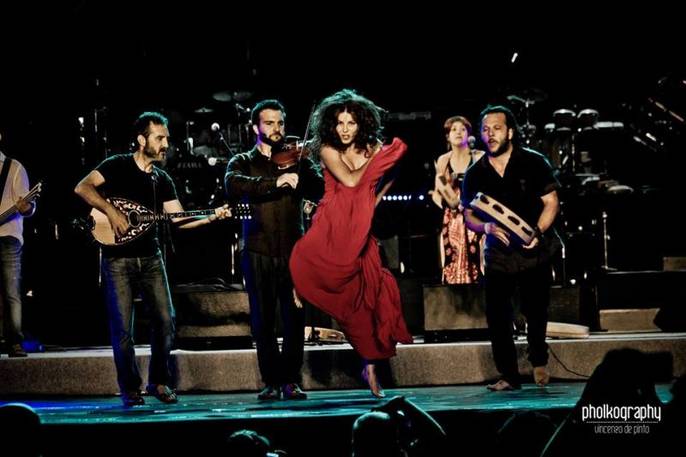


Canzoniere Grecanico Salentino (GCS) introduced North American audiences to the power of Taranta for the first time in 2011. The group's critically acclaimed debut tour led to a pair of high profile invitations for appearances at the 2012 editions of globalFEST and Womex, the international music market's two top showcase events. Now they are coming back, this is their fourth time in the States in 2013, for HitWeek (September 7 – October 30 in New York, Los Angeles, Miami and Toronto), the world's only music festival showcasing Italy's current scene on the global stage.
Hailing from the area of Salento, in Puglia, the seven piece band and dancer are the number one exponents in a new wave of young performers re-inventing Southern Italy's Pizzica Taranta music and dance traditions for today's global audience. Pizzica is part of the larger family of tarantellas.
The Pizzica Taranta is the music that marked the ancient healing ritual against the bite of a tarantula, the dangerous poisonous spider. According to tradition, in order to drive out the demon thought to have taken possession of the victim, usually a woman, tambourines should be beaten incessantly. The dizzily rhythmic sound of the tambourine combined with a frenzied hypnotic dance healed the victim of the poison.
i-ItalyINY highlights - a special performance of Canzoniere Grecanico Salentino.
Live at Michael Schimmel Center for the Arts (NYC). February 1, 2013.
“Canzoniere Grecanico Salentino was born in 1975 from an idea by Rina Durante (an intellectual from Salento), sprung from the cultural and political folk revival of the 70s. Among its founders there were my father, guitarist and mandolinist Daniele Durante and my mother Rossella Pinto,” Mauro Durante, the group's current leader said when interviewed for the first time by i-Italy in 2011, “It's pretty clear that my home has always been permeated by this music and ethnomusicological sounds. Our challenge was and still is to find a form of expression that makes this music current and captivating, without corrupting its original beauty and purity.” In 2007, Daniele Durante passed the leadership of CGS to his son, Mauro, who had joined the band at 14 as a percussionist and violinist.
Few bands have represented Salento and its culture as long and devotedly as Canzoniere Grecanico Salentino, whose name translates roughly as the Salentine Greek Songbook, 'Grecanico' referring to the ancient Greek-derived language spoken in southern Puglia and parts of Calabria.
“Our music is strictly linked to dancing, a movement driven by the obsessive rhythm of the tambourine, that, just like a pulsating heart, envelops and seduces you, making it impossible to stand still,” Mauro continued to explain, “this music is a pure declaration of the love for your own country, it comes from the past but it is felt and performed in the present and looks at the future with energy and rhythm.”
“Canzoniere Grecanico Salentino takes its own liberties with the tradition, incorporating a few modern instruments — including, for some songs, electric bass — and arranging its songs with a variety of textures and details that suit the stage and recording studio,” the New York Times wrote about the group back in June after a performance they had at Joe's Pub.
“This music and this dance are important for us right now, in the exact moment when we are experiencing them,” Marco explained to i-Italy, “The way we treat them is current, they are not stuffy museum pieces or postcards of a past that does not exist anymore. That's why we chose traditional pieces whose theme is current and universal. We also write new songs that describe our reality, yes, the reality of seven young artists who tell of, through a language whose roots go centuries back in time, the culture of their land with new music, current messages and concepts, contemporary energy while always looking at the future.”
“Pizzica, music and dance have the power to transcend the barriers of time and language,” Mauro continued to explain when asked about the possible barriers with an American audience, “They speak directly to the instinctive side of us all. So many times we listen to songs sung in a foreign language, this does not mean we like it less. In our case, the audience is captured by our music, they listen, they let go and they let themselves be embraced by dance!”
Source URL: http://test.iitaly.org/magazine/events/reports/article/bringing-music-salento-hitweek
Links
[1] http://test.iitaly.org/files/canzonieregrecanicosalentinonyc1380657444jpg